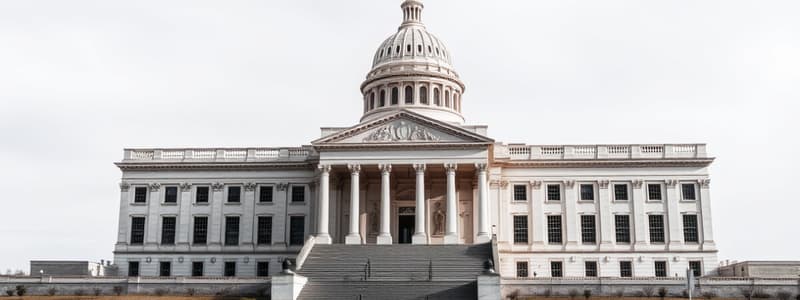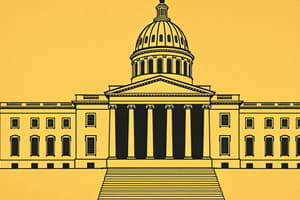Podcast
Questions and Answers
Why has the House of Representatives grown so much faster than the Senate? (Select all that apply)
Why has the House of Representatives grown so much faster than the Senate? (Select all that apply)
- Fewer and fewer representatives have been re-elected to additional terms.
- The number of senators allowed per state has been routinely reduced.
- The Constitution requires the number of representatives to increase each decade.
- Representation is based on population, and the US has grown steadily. (correct)
Article I, Section 8 of the Constitution describes what kind of congressional powers?
Article I, Section 8 of the Constitution describes what kind of congressional powers?
- Expressed (correct)
- Proper
- Necessary
- Reserved
What can happen if the president chooses to veto a law that has been passed?
What can happen if the president chooses to veto a law that has been passed?
- The law is rejected and cannot be reconsidered.
- The president's decision is scheduled for review within a year.
- The president's decision can be overridden by a majority of Congress. (correct)
- The law returns to being introduced in one of the houses.
Which is an example of an expressed power Congress holds?
Which is an example of an expressed power Congress holds?
Which of these is an expressed power of Congress?
Which of these is an expressed power of Congress?
Which of these actions is forbidden by the Constitution?
Which of these actions is forbidden by the Constitution?
Which of these steps might happen after a bill is sent to the president?
Which of these steps might happen after a bill is sent to the president?
After a bill has been introduced, what happens next?
After a bill has been introduced, what happens next?
Congress checks on the power of the presidency by
Congress checks on the power of the presidency by
Which statement applies to both senators and representatives?
Which statement applies to both senators and representatives?
Flashcards are hidden until you start studying
Study Notes
Growth of the House of Representatives
- House of Representatives has expanded faster than the Senate due to representation based on state population.
- The structure allows for an increase in the number of representatives as the US population grows.
- The Senate's composition remains fixed with two senators per state, limiting growth compared to the House.
Congressional Powers
- Article I, Section 8 of the Constitution outlines properly expressed and necessary powers of Congress.
- Powers include areas such as taxation, regulation of commerce, and national defense.
Presidential Vetoes
- If a president vetoes legislation, it returns to Congress where it can be overridden by a majority vote.
- Congressional override is a key check on presidential power.
Examples of Expressed Powers
- Expressed powers include declaring war, maintaining military forces, and creating a national banking system.
- Congress cannot take away habeas corpus rights or unilaterally change constitutional amendments.
Forbidden Actions
- The Constitution explicitly prohibits the creation of ex post facto laws, which would penalize actions retroactively.
- Legislative actions must adhere to constitutional norms to ensure justice and fairness.
Legislative Process
- After a bill is introduced, it undergoes committee review before being debated on the floor.
- The president plays a crucial role in the legislative process by either approving, vetoing, or allowing a bill to become law without a response.
Congressional Checks on the Presidency
- Congress exercises checks on presidential authority by the ability to override vetoes.
- Legislative actions and debates require collaboration between both houses of Congress for effective governance.
Role of Senators and Representatives
- Senators and representatives can be expelled for ethical violations and misconduct.
- Both must meet specific qualifications, but a college education and voter registration are not requirements.
Studying That Suits You
Use AI to generate personalized quizzes and flashcards to suit your learning preferences.




